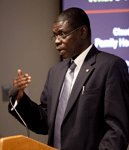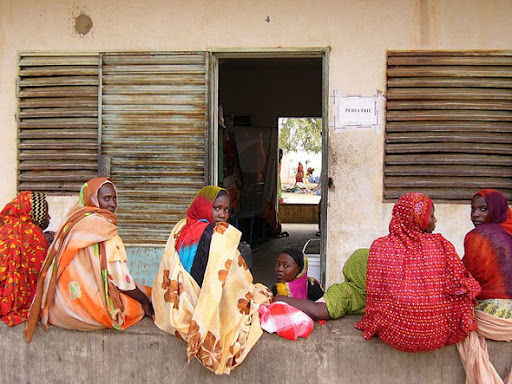-
Family Planning in Fragile States
›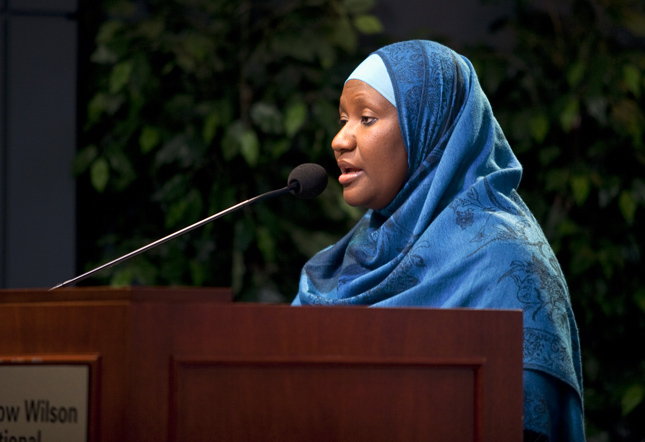
“Conflict-affected countries have some of the worst reproductive health indicators,” said Saundra Krause of the Women’s Refugee Commission at a recent Wilson Center event. “Pregnant women may deliver on the roadside or in makeshift shelters, no longer able to access whatever delivery plans they had. People fleeing their homes may have forgotten or left behind condoms and birth control methods.”
-
Maternal Health Solutions in Peru
›Media reports on the neglected discussion of maternal and child health often focus on the problems and projects in sub-Saharan Africa or South Asia, which is understandable, as a disproportionate 90 percent of global maternal deaths occur in these two regions. Last month, however, PBS correspondent Ray Suarez reminded us that maternal and child mortality affects countries all over the world, including Peru, where “maternal death rates has historically been unusually high,” he noted in a report for NewsHour.
“Few people in the highlands of central Peru own automobiles and it’s hard to know exactly when the next bus is going to rumble by,” said Suarez. “Villagers are a long way from the nearest health clinic, even further from a fully equipped clinic.” Unfortunately, this scene could describe most developing countries struggling to reach the Millennium Development Goal (MDG) 5 target of reducing maternal deaths by 75 percent by 2015. Maternal health advocates argue that MDG 5 does not require a cure, but rather increased political willpower.
“Health officials, obstetricians, nurses, and community activists looked for ways to make better use of existing resources and connect expecting mothers with them,” said Suarez, reporting from the remote town of Vilcashuaman. At the Casa Materna, or “mother’s house,” nurses plot on a felt, bulls-eye map the names, due dates, geographical proximity, and travel times of pregnant women in nearby villages. Utilizing two-way radio communication, Casa Materna stays in contact with these remote villages and can signal the regional hospital, hours away in Ayacucho, for ambulance assistance for women needing emergency obstetric care.
Delivery teams at the Ayacucho hospital are familiar with indigenous languages and cultures, and welcome traditional practices, such as displaying herbs and giving figurines to new mothers. “The medical professionals in the area know bringing delivering mothers to the hospital can mean the difference between life and death and are prepared to be as accommodating as possible to lure women from home delivery,” reports Suarez. In the Ayacucho district, maternal mortality rates have decreased by 50 percent in five years.
While Suarez said “cultural competence, a welcoming atmosphere, and low-cost, high-result treatment strategies” may seem “pretty smart and straightforward,” it is important to evaluate the regional health system at a larger level, and consider additional factors, such as access to family planning, that may have contributed to Ayacucho’s success in reducing maternal mortality.
Another part of the solution is improving transportation and referral strategies, but increased research is needed to evaluate best practices and scalability of programs such as the one in Ayacucho. On May 19-20, as part of the Maternal Health Dialogue Series, the Wilson Center’s Global Health Initiative will host a two-day conference on “Improving Transportation and Referral for Maternal Health.” Speakers working on transportation and referral strategies in Bolivia, Ghana, and India will share their experiences and best practices.
Calyn Ostrowski is the program associate for the Wilson Center’s Global Health Initiative.
Photo Credits: Mothers in Peru learn to identify risk factors during pregnancy. Courtesy of Flickr user International Women’s Health Coalition -
Maternal and Newborn Health as a Priority for Strengthening Health Systems
›Among the many initiatives that have recently been launched to strengthen health systems in the developing world, there is little consensus on execution. Traditional strategies for improving the health system, such as the vertical approach, which prioritizes communicable diseases, or the horizontal approach, which prioritizes non-communicable diseases, are limited in scope and fail to include a comprehensive gender lens.
To overcome the shortcomings of these two health financing approaches, the “diagonal” strategy combines them by “clearly defining priorities and utilizing these priorities to drive general improvements of the health system,” said Julio Frenk, dean of the Harvard University School of Public Health, at the Global Health Initiative’s third event in the “Advancing Policy Dialogue on Maternal Health” series.
Along with panelists Helen de Pinho of Columbia University, and Agnes Soucat of the World Bank, Frenk discussed how prioritizing key maternal health indicators can improve health systems and support the implementation of evidence-based interventions. Putting Women and Health First
Putting Women and Health First
Drawing on his experience as Mexico’s minister of health, Frenk said that clearly defining a set of priorities grounded in “women and health” drove the improvement of Mexico’s health system. “Picture three concentric circles. The core of these concentric circles is the prevention of maternal mortality and disability; the second circle [includes] other aspects of sexual and reproductive health in addition to pregnancy and delivery; the third circle includes other fundamental areas of women’s health and the intersection of women with the health system,” said Frenk.
Mexico used maternal mortality rates to measure quality of care and rectify weaknesses in the health system. “Every maternal death triggered an audit that could lead to a hospital losing its license to operate,” said Frenk. Additionally, these audits helped to identify gaps and prioritize investments in “equipment and supply of drugs…and networks [for] obstetric emergencies,” he added.
“This illustrates how you can take a specific set of priorities and drive them through,” argued Frenk. “Global health needs to get out of the traditional confines that have split the community between vertical and horizontal and adopt more integrated frameworks like the notion of women and health,” he said, which “will leave behind a better health system to deal with the next challenge.”
Measuring Maternal Health
The maternal health community agrees that to reduce maternal mortality rates, access to emergency obstetric care (EmOC) must be improved. “A simple assessment of an emergency obstetric care facility combines a number of aspects that are core to strong health systems,” said de Pinho. To reduce maternal mortality, a strong health system must be able to positively answer these key questions:
These questions monitor the availability, utilization, and quality of care, which signals whether “the health system is actually responding to the woman’s needs when they need it,” said de Pinho. These maternal health indicators “paint a picture for where next steps need to be taken,” she said.- Are there enough facilities providing EmOC and are they well distributed?
- Are women with obstetric complications using these facilities?
- Is the quality of the EmOC services adequate?
Rwanda’s Innovations in Health Financing
“When we talk to ministries of health we ask them what are the low-hanging fruits we can reach in the six years” until the deadline for meeting the Millennium Development Goals (MDGs), said Soucat. To implement methods with proven results, additional research data, monetary support, and political will are all necessary. Rwanda’s ministry of health used the health-related MDGs—particularly MDG 5 to reduce maternal deaths by 75 percent—to reform the health system and hold institutional and individual actors accountable.
Rwanda’s health system was reformed through five key pillars:
“The heart of the reform is to increase accountability to its citizens,” said Soucat. Rwanda’s results-based financing offered “incentives and salary supplements to workers who saw more patients and provided higher quality of care,” she said. Impact assessments demonstrate that all income groups in Rwanda benefited from this health care scheme; in three years family planning tripled and assisted deliveries increased by 13 percent –“something that has never been observed in Africa,” she said.- Fiscal decentralization increased community participation and allocated funds to district governments
- Performance contracts were established between the president and district mayors
- A performance-based financing system distributed money to health facilities based on results
- Community health insurance increased access and reduced out-of-pocket expenditures
- Autonomous health facilities were allowed to hire and fire personnel
Rwanda’s Ministry of Health conducted rigorous assessments to ensure quality services and demonstrate impact to the Ministry of Finance. “When talking about maternal health a strong dialogue between the Ministry of Health and Ministry of Finance is needed more than ever and centered around the production of results,” argued Soucat. Scaling up the results-based finance scheme in other African countries is possible, she said, but additional research is needed to better understand this scheme at the decentralized level. -
Point of View: Investing in Maternal Health
› Every minute, a woman dies in pregnancy or childbirth. But the overwhelming majority of these more than 500,000 deaths a year are avoidable.
Every minute, a woman dies in pregnancy or childbirth. But the overwhelming majority of these more than 500,000 deaths a year are avoidable.
“We know how to save women’s lives, we don’t need a cure…this is a political problem and political will is essential,” said Theresa Shaver, the director of White Ribbon Alliance.
Addressing longstanding issues like political will could jumpstart progress toward Millennium Development Goal 5, which seeks to reduce maternal deaths by 75 percent by 2015. We face daunting challenges, but there are some clear steps we can take to meet this critical goal. We must strengthen health systems in the developing world.Increasing women’s access to quality health services during pregnancy, and ensuring they are attended by skilled providers during childbirth, can help to reduce preventable causes of death, such as hemorrhage, pre-eclampsia, and obstructed labor—which together account for 80 percent of maternal deaths.
Scaling-up family planning services are a cost-effective way of preventing unwanted pregnancies, delaying the age of first pregnancy, increasing the time between pregnancies, and facilitating important relationships between women and health care providers. However, many societal and cultural factors dissuade women and girls from seeking contraception. Culturally sensitive education programs can help overcome this barrier, especially if they include men and local leaders, in addition to women and girls.
We should recognize that improving the well-being of mothers is inseparable from the health of newborns. Efforts to reach Millennium Development Goal 4, reducing under-5 mortality by two-thirds, are integral to improving maternal health. Skilled birth attendants could decrease both maternal and child mortality.
In the United States and abroad, momentum is growing to make the investment necessary to scale up these interventions. In January, Secretary of State Hillary Clinton renewed a commitment of $63 billion for the Obama Administration’s Global Health Initiative, which will include significant resources for maternal and child health.
According to the U.S. Agency for International Development, maternal and newborn deaths cost the world $15 billion a year in lost productivity. Researchers conclude that maternal health services would cost only a $1 per day per woman. That’s a small price to pay for such a high return—saving not only dollars, but also women’s lives.
For more information about maternal health and the Global Health Initiative’s Advancing Policy Dialogue on Maternal Health Series please see this month’s issue of Centerpoint. -
Watch: Harriet Birungi: Challenges Facing HIV-Positive Adolescents in Kenya
›“Services are not necessarily very adolescent-friendly, so when you get children who are HIV-positive they are likely to face discrimination,” says Harriet Birungi, an associate in the Reproductive Health Program with the Population Council in Kenya, in this interview with ECSP’s Gib Clarke following the Global Health Initiative’s Integrating HIV/AIDS and Maternal Health Services panel.
According to Birungi, medical service censoring and targeted exclusion from schools are among the top challenges facing Kenyan adolescents living with HIV/AIDS. She hopes better support systems and intervention strategies, especially for pregnant individuals, will help medical personnel more quickly identify HIV-positive young adults needing critical medical services. -
Human Resources for Maternal Health
› “Pregnancy is not a disease, a woman should not die of pregnancy…it doesn’t need a new drug…it doesn’t need research – we just need skilled workforce at different levels,” argued Seble Frehywot, assistant research professor of Health Policy and Global Health at George Washington University, at the Global Health Initiative’s second event of the Advancing Policy Dialogue on Maternal Health Series.
“Pregnancy is not a disease, a woman should not die of pregnancy…it doesn’t need a new drug…it doesn’t need research – we just need skilled workforce at different levels,” argued Seble Frehywot, assistant research professor of Health Policy and Global Health at George Washington University, at the Global Health Initiative’s second event of the Advancing Policy Dialogue on Maternal Health Series.
Research shows that increased access to skilled health workers during pregnancy and delivery, including midwives and other practitioners, can significantly reduce maternal mortality in developing countries. One solution to the current human resource crisis is to expand, and in many cases, acknowledge, the skills and responsibilities of non-physician health workers.
Task-Sharing: Who, What, and How
“There are too many preventable deaths…if we look at the data, quality maternal health services are not available,” argued Frehywot, as she presented the following evidence:
There are four common types, or levels, of task-shifting:- Countries that have the highest maternal mortality rates are those that also have the greatest worker shortage
- In Africa, for every 10,000 births, only 2 physicians and 11 nurses or midwives are present at delivery.
- According to the World Health Organization, there needs to be at least 53 skilled health care workers (nurses, doctors, midwives) per 10,000 births to meet Millennium Goal 5 which seeks to reduce maternal deaths by 75 percent by 2015.
1. Doctors to non-physician health clinicians
“All [task-shifting] needs to be done through a sound regulatory framework…it is very important to match tasks that are needed at the ground level with the competency needed to back it up,” maintained Frehywot. Regulatory issues such as the scope of practice, standard of care, training, licensure, and supervision must be addressed to ensure safe and high-quality treatment. Additionally, political buy-in and commitment from the Ministry of Health, medical universities, and professional councils and associations are necessary for long-term development, argued Frehywot.
2. Health clinicians to registered nurses and midwives
3. Nurses/midwives to community health care workers
4. Community health care workers to expert patients
Policies for scaling-up human resources should start at the district level, as these localized hospitals are geographically closest to the need, argued Frehywot. “If one really wants to decrease the maternal mortality ratios, especially by 2015, this is where most of the people live.”
Applying Task-Shifting in Afghanistan “Maternal mortality ratios in Afghanistan are the second highest in the world,” declared Jeffrey Smith, regional technical director for Asia at Jhpiego. In 2002, when Smith arrived in Afghanistan, there were limited health workers, most with out-of-date skills, and no functional schools for training. “The most important decision made early in the reconstruction [of] Afghanistan was that midwives would be the backbone of the reproductive health workforce and they would be empowered with the skills to perform the tasks necessary for provision of basic emergency obstetric care,” shared Smith.
“Maternal mortality ratios in Afghanistan are the second highest in the world,” declared Jeffrey Smith, regional technical director for Asia at Jhpiego. In 2002, when Smith arrived in Afghanistan, there were limited health workers, most with out-of-date skills, and no functional schools for training. “The most important decision made early in the reconstruction [of] Afghanistan was that midwives would be the backbone of the reproductive health workforce and they would be empowered with the skills to perform the tasks necessary for provision of basic emergency obstetric care,” shared Smith.
Making the case for task-shifting, Smith discussed the importance of empowering health workers on the front line so that they may provide services in the most peripheral areas. “Task shifting should not be a temporary fix until we have more doctors,” argued Smith, as this framework disenfranchises a cadre of health workers and fails to build long-term solutions for human resources. Instead, Smith advocated for the “Health Center Intrapartum Care Strategy” that makes midwives the foundation of care and includes strategies for training, staffing, and linkages to the overall health system.
In this post-conflict setting, task-shifting began as an emergency approach. However, it rapidly became a development strategy for professionalizing the workforce and rebuilding the health system. Afghanistan’s Ministry of Public Health was imperative to the success of scaling up midwives as they clearly defined from the beginning what was needed and who would provide care, taking steps to ensure that the midwifery schools maintained legitimacy and received formal accreditation.
“Keep it clinical and keep it local,” shared Smith. The midwifery schools made efforts to recruit individuals from the provincial level, teaching specific life-saving skills applicable in the field. This framework has successfully retained 86% of its graduates, and many of the women report that the program has provided them with a sense of community and ownership.
Building a Sustainable Health Workforce “We invite the maternal health community to take advantage of the incredible momentum that human resources for health is having right now,” shared Pape Gaye, president and CEO of IntraHealth. While there are many issues within the health system that need to be strengthened, Gaye maintained that “we must pick our battles” and advocated for an emphasis on scaling-up the training and availability of midwives.
“We invite the maternal health community to take advantage of the incredible momentum that human resources for health is having right now,” shared Pape Gaye, president and CEO of IntraHealth. While there are many issues within the health system that need to be strengthened, Gaye maintained that “we must pick our battles” and advocated for an emphasis on scaling-up the training and availability of midwives.
In order to scale-up midwives for maternal health we must avoid the same old traps, particularly the lack of donor coordination shared Gaye. “If we do a better job of improving coordination we will start solving the problem.” Additionally, Gaye discussed the implications for training generation “Y,” emphasizing the importance of including new technologies available for training, including PDA’s and e-learning courses.
Performance outcomes and training are the two key pillars of effective scale-up, shared Gaye. Task-shifting also requires legal support and the endorsement from medical associations to help legitimize this new health system framework. “This is not simple work; you really need to have a systems approach. What we seek in the end is good integration. Integration across systems, integration across roles, courses, learning processes, and training for maximum adaptability,” shared Gaye. -
Integrating HIV/AIDS and Maternal Health Services
›
Integrating maternal health and HIV/AIDS services “includes organizing and providing services that meet several needs simultaneously…focusing not only on the condition, but also the individual,” argued Dr. Claudes Kamenga, Senior Director of Technical Support and Research Utilization at Family Health International, during the first event of the Advancing Policy Dialogue on Maternal Health series co-convened by the Wilson Center’s Global Health Initiative, Maternal Health Task Force (MHTF), United Nations Population Fund (UNFPA), and technical support from U.S. Agency for International Development (USAID). Joined by Michele Moloney-Kitts, assistant coordinator at the Office of the U.S. Global AIDS Coordinator, and Harriet Birungi, a program associate with the Population Council in Kenya, the panelists discussed how integration of HIV/AIDS and maternal health services not only improves health outcomes, but also increases program efficiencies, strengthens health systems, and saves money.
-
Tackling the Biggest Maternal Killer: How the Prevention of Postpartum Hemorrhage Initiative Strengthened Efforts Around the World
›On Friday, November 20th, 120 representatives from the maternal health community, the U.S. and around the world, gathered for an all day meeting at the Woodrow Wilson International Center for Scholars to discuss the report, Tackling the Biggest Maternal Killer: How the Prevention of Postpartum Hemorrhage Initiative Strengthened Efforts Around the World. This report describes the challenges and successes of the U.S. Agency for International Development (USAID) funded Prevention of Postpartum Hemorrhage Initiative (POPPHI).
The five-year POPPHI project was executed through the support of many partners whose main goal was to catalyze the expansion of active management of the third stage of labor (AMTSL) worldwide. The conference convened experts and advocates in the field of maternal health, to share best practices, new innovations, and future challenges for tackling maternal health’s leading killer: postpartum hemorrhage (PPH). Panelists included POPPHI field partners such as International Federation of Gynecology and Obstetrics, The International Confederation of Midwives, the World Health Organization, and international researchers.
Preventing Postpartum Hemorrhage: AMTSL
“We need to work on women postpartum–after birth we leave them,” argued Deborah Armbruster, POPPHI Project Director. Due to the fact that many women in the developing world give birth at home or in local clinics that lack the sufficient resources to prevent postpartum hemorrhaging, approximately 132,000 women die annually. Fortunately, effective and feasible interventions such as those established by POPPHI have been proven to save lives.
Active management of the third stage of labor (AMTSL) includes three factors that, when used together, can avert postpartum hemorrhage, including:1. Administration of uterotonic drugs (including oxytocin – the most preferred drug)
POPPHI’s “BOLD” Approach
2. Controlled cord contraction
3. Uterine massage after the delivery of the placenta
In collaboration with its partners, POPPHI implemented country-level and global programs to scale up AMTSL. Driven by the “BOLD” approach, Armbruster described how the initiative provided overall frameworks and approaches for strengthening PPH interventions by Building on evidence, Obtaining consensus, Linking partners, and Demonstrating to policymakers AMTSL’s feasibility.
Additionally, POPPHI provided learning materials such as toolkits, fact sheets, posters, and guides that were used to train providers and increase their use of AMTSL. A pilot project on Uniject (a single use needle pre-prepared with oxytocin) was also executed in Mali. Uniject was shown to be acceptable and successful with birth attendants there, and the study is now being replicated in Honduras.
Voices from the Field
Representatives from Argentina, Bangladesh, Ghana, Guatemala, Peru, and Mali presented their country results with the POPPHI project–concluding that the initiative served as a catalyst for upscaling AMTSL. Dr. Abu Jamil Faisel, Project Director and Country Representative of EngenderHealth in Bangladesh, discussed how the project helped to break through misperceptions that often prevented women from wanting to use misoprostol. In Ghana, policymakers worked with program managers and drug suppliers to register misoprostol in the country’s essential medicine list and updated guidelines to reflect best practices. While each country’s experiences were unique, the importance of partnerships was common to successfully upscaling AMTSL in all locations.
Partnerships: Critical to Success
Integrating maternal health indicators directly into program design is imperative to upscaling AMTSL, argued Niamh Darcy, Director of POPPHI Monitor and Evaluation. Additionally, Darcy argued that the success of POPPHI is due to the project’s emphasis in working with all levels of partners, particularly facility providers. Working with the supportive supervisors at facilities is necessary according to Darcy because this group is ultimately responsible for executing active management and recording project outcomes.
Identifying African experts who have taken leadership and ownership of the project has been instrumental in POPPHI successfully disseminating results at the regional, national and international levels argued Doyin Oluwole, Director, Africa’s Health in 2010. Partnering with local champions as well as policymakers has enabled many of the country projects to build capacity and upscale AMTSL.
Building on Lessons Learned
“A key lesson we have learned is that, when there is political commitment, AMTSL is rapidly scalable,” stated Lily Kak, Senior Maternal and Newborn Health Advisor, USAID. Changing behaviors and practices takes significant amount of resources and time commitment, however, POPPHI demonstrates that partnerships and research can be used to upscale AMTSL and change policies more efficiently.
Photo: Women wait outside a maternity ward in Chad. Courtesy of Flickr user mknobil.
Showing posts from category Dot-Mom.


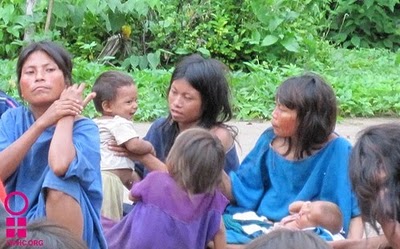
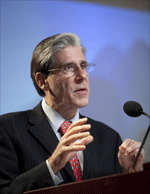 Putting Women and Health First
Putting Women and Health First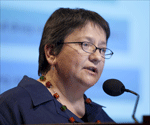
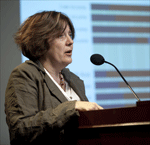
 Every minute, a woman dies in pregnancy or childbirth. But the overwhelming majority of these more than
Every minute, a woman dies in pregnancy or childbirth. But the overwhelming majority of these more than 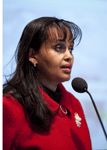 “Pregnancy is not a disease, a woman should not die of pregnancy…it doesn’t need a new drug…it doesn’t need research – we just need skilled workforce at different levels,” argued Seble Frehywot,
“Pregnancy is not a disease, a woman should not die of pregnancy…it doesn’t need a new drug…it doesn’t need research – we just need skilled workforce at different levels,” argued Seble Frehywot, 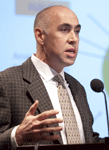 “
“ “We invite the maternal health community to take advantage of the incredible momentum that human resources for health is having right now,” shared Pape Gaye, president and CEO of IntraHealth. While there are many issues within the health system that need to be strengthened, Gaye maintained that “we must pick our battles” and advocated for an emphasis on scaling-up the training and availability of midwives.
“We invite the maternal health community to take advantage of the incredible momentum that human resources for health is having right now,” shared Pape Gaye, president and CEO of IntraHealth. While there are many issues within the health system that need to be strengthened, Gaye maintained that “we must pick our battles” and advocated for an emphasis on scaling-up the training and availability of midwives.